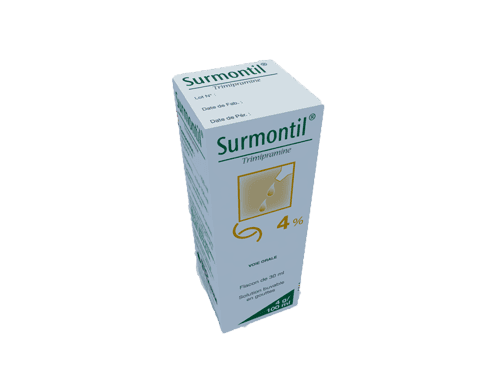This is an automatically translated article.
Surmontil is used in the treatment of depression. It can help improve your mood, provide a sense of well-being, and help you enjoy your day-to-day life better. The reaction to the medication is usually immediate, but improvement in mood can take about two weeks.
1. Uses of the drug Surmontil
Surmontil (trimipramine) is a tricyclic antidepressant, used to treat depression, and it also has some sedative properties. The drug is a serotonin and norepinephrine reuptake inhibitor. The reaction is immediate, but improvement in mood can take about two weeks.
It is thought that Surmontil causes changes in sensitivity of receptors in the cerebral cortex and hippocampus in the limbic system (involved in the regulation of emotions). Surmontil also inhibits Beta-adrenergic and serotonin receptors.
The US Food and Drug Administration (FDA) approved trimipramine maleate (Surmontil) in 1982 as 25mg and 50mg capsules. The 100mg formulation was approved in 1982. The FDA then approved generic versions of all three formulations in 2006.
2. How to take Surmontil
Take Surmontil by mouth with or without food, usually one to three times daily or as directed by your doctor. If taking this medication once daily, take it at bedtime to reduce the risk of drowsiness. Surmontil doesn't work right away, it takes 2 to 4 weeks before you get the full benefits of the medicine.

Dùng thuốc Surmontil bằng đường uống cùng hoặc không với thức ăn
3. Surmontil side effects
Surmontil also has some typical side effects of tricyclic antidepressants, such as dizziness, drowsiness, difficulty urinating, headache, weakness, sexual dysfunction, appetite changes, weight change, dry mouth, blurred vision, constipation. Inform your doctor if you experience any of the above symptoms.
You can prevent constipation by eating enough fiber, drinking plenty of water and exercising regularly. You can also consult your doctor about taking a laxative.
4. Precautions while using Surmontil
Before taking Surmontil, tell your doctor if you are allergic to it or to other tricyclic antidepressants (eg amitriptyline, imipramine).
Like many other tricyclic antidepressants, Surmontil carries some significant risks to be aware of. If prescribed this medicine, make sure you give your doctor the following information:
Surmontil may cause changes in behavior, especially in children, and may increase suicidal thoughts or behavior. Particular attention should be paid to the patient's mood when starting treatment, adjusting the dose and stopping the drug. People who are recovering from an acute episode of a heart attack (heart attack) should avoid using this medicine. Discuss your complete history of heart disease with your doctor before taking. Surmontil may increase the effects of catecholamines found in the body. This aggravates the pheochromocytoma. It may also reduce or increase the frequency of seizures. In patients with compromised liver function, the metabolism of Surmontil will also be reduced. In these cases, the dosage will need to be adjusted. People with kidney failure cannot eliminate the drug from the body. This may cause accumulation of the active metabolite of surmontil in the body. Surmontil may trigger symptoms associated with schizophrenia and bipolar disorder. If you experience these conditions, make sure your doctor knows before prescribing them. The FDA has classified this drug as Category C for pregnancy, which means that some animal studies have shown adverse effects on the fetus. There are no significant body studies on its effects on pregnancy in humans or whether this medicine can be excreted in human milk. All benefits should be carefully weighed against the potential risks before prescribing Surmontil during pregnancy or continuing treatment if a person becomes pregnant.
Do not reduce your dose or stop taking Surmontil suddenly without talking to your doctor. To reduce the severity and occurrence of withdrawal symptoms, it is best to reduce the dosage gradually. Talk to your doctor to come up with the safest plan for you. Some withdrawal symptoms may include: Irritability, persistent headache, flu-like symptoms.

Người đang hồi phục sau nhồi máu cơ tim cấp tính nên tránh sử dụng Surmontil
5. Drug interactions
Some drugs that may interact with trimipramine include: Anticholinergics (atropine, belladonna alkaloids); clonidine; medicine for high blood pressure (guanadrel, guanethidine); drugs that affect liver enzymes (including cimetidine, haloperidol, protease inhibitors); drugs that affect heart rhythm (flecainide, quinidine, propafenone); motion sickness drugs (meclizine, scopolamine); thyroid medication.
Monoamine oxidase inhibitors (MAOIs): These can cause serious and fatal drug interactions if combined with Surmontil. MAOIs should be avoided for two weeks after stopping Surmontil treatment.
Selective serotonin reuptake inhibitors (SSRIs) and serotonin, norepinephrine reuptake inhibitors (SNRIs): SSRIs and SNRIs used together with Surmontil may cause serotonin syndrome.
Many drugs besides trimipramine can affect heart rate (QT prolongation on electrocardiogram), including disopyramide, dronedarone. Therefore, before using Surmontil, tell your doctor about all the medicines you are taking.
Tell your doctor if you are using other medicines that also cause drowsiness such as: Opioid pain relievers, cough suppressants, alcohol, sedatives, muscle relaxants or antihistamines. In addition, cough syrups that may contain antihistamines or alcohol may cause drowsiness when taken with Surmontil.
Please dial HOTLINE for more information or register for an appointment HERE. Download MyVinmec app to make appointments faster and to manage your bookings easily.
Reference sources: webmd.com, goodtherapy.org












